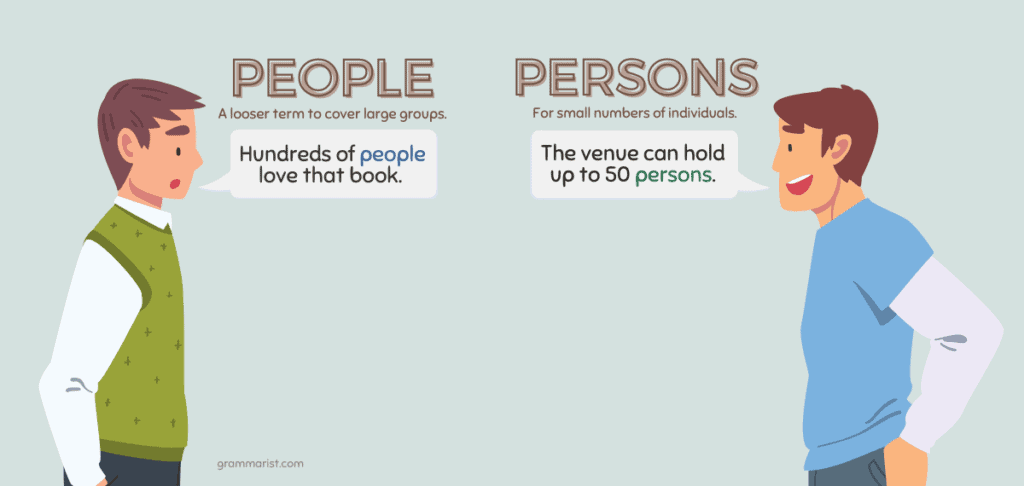What is the difference between persons and people? That’s a good question, and the answer lies in the delicate intricacies of the English language. So, buckle up, my friends, because we’re about to unpack this grammatical suitcase and clear up the confusion between people and persons.
People vs. Persons: The Plural of Person

Both persons and people are what we call collective nouns, and both are the plural forms of the singular noun person. Wait, they’re both the correct term? Yes and no. Let me explain.
The word people is the most common and de facto plural form, but persons is also grammatically correct, just used less frequently and in more specific contexts. I’ll go a little deeper for you.
When to Use Persons
Persons has a more formal tone, and we often use it in legal writing or technical documents as a blanket term for any people involved. The term is generally used when the number of individuals is small and can be counted. As an example, a sign might state, “This elevator is designed to hold no more than four persons.”
When to Use People
Then we have the word people, which is also the plural of person and the term you’ll want to use in casual conversation or writing. This is the commonly accepted plural form, and you can use it to refer to a group of individuals where the exact count is irrelevant, or the group is too large.
For example, “People love to eat pizza.” So, basically, persons is for small numbers of individuals, and people is for a looser term to cover large groups.
Synonyms for People and Persons
You could always switch things up and try some other words with the same meanings.
- Citizens
- Public
- Individuals
- Society
- Community
- Group
- Inhabitants
- Humans
People Examples in a Sentence
Let’s see how the word people fits into everyday language.
- Our neighborhood park was bustling with people enjoying the sunny day with their dogs.
- People often say that laughter is the best medicine, and I have to agree.
- Hundreds of people love that book.
- She’s always been a people person; she thrives in social situations, unlike me.
- The event was a huge hit; people from all over the province attended.
- Most people love a good joke, especially when it’s told well.
Using the Word Persons: Examples in a Sentence

Now, let’s see persons strut its stuff.
- Three persons were arrested for trespassing on his private land.
- I asked, and the venue can hold up to 50 persons.
- The environmental report was distributed among the concerned persons.
- Cops found the belongings of two persons at the murder scene.
- All persons entering the building must sign in at the front desk before proceeding upstairs.
People or Persons, That’s the Question
So, the next time you’re wondering whether to use persons or people, just remember this guide I made for you. People is your go-to for casual language and large, uncountable groups, and persons works best in formal usage and when the number of individuals can be counted.

Comments are closed.